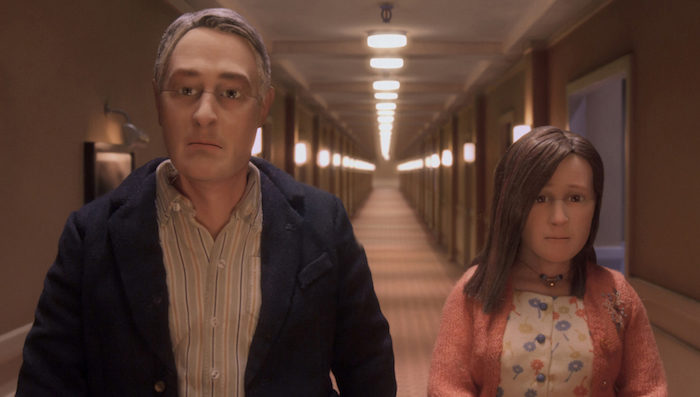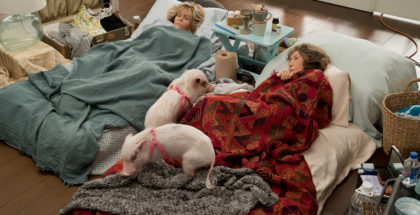VOD film review: Anomalisa
Review Overview
Noise of isolation
9Sound of romance
9David Farnor | On 11, Dec 2016
Director: Charlie Kaufman
Cast: David Thewlis, Tom Noonan, Jennifer Jason Leigh
Watch Anomalisa online in the UK: Apple TV (iTunes) / Prime Video (Buy/Rent) / Google Play
It’s been many years since Charlie Kaufman’s ambitious directorial debut, Synecdoche, New York, a sprawling, chaotic, exhaustingly brilliant mess. Now, he’s back with Anomalisa, a tiny tale of isolation and romance. The result is far simpler – but no less brilliant.
The film follows Michael Stone (Thewlis), a man who travels to Cincinnatti to deliver a speech about customer service. “Be personable,” is his mantra, but, inevitably, he’s as impersonal as it gets: he sighs at cab drivers, has no idea what to say to his son and scares away old flames with intense talk of reunion.
It’s familiar territory for the neuroses-laden writer of Eternal Sunshine of the Spotless Mind, but Kaufman and co-director Duke Johnson give their tale a renewed sense of alienation by staging the whole thing with puppets – oddly enough, a medium that feels like a homecoming for the Being John Malkovich creator. Michael’s existential uncertainty is visible on his face: a fragmented mask in which you can see the cracks wobble and widen as each frame progresses. More than that, though, it’s audible: all the other characters in the cast are voiced by Tom Noonan, a fact that leaves the world around Michael feeling bland, creepy and artificial, all at the same. Hotel receptionists sound like cab drivers, who sound like airplane passengers. Even his wife and child are indistinguishable, something that becomes awkwardly apparent following one hilarious phone call home.
As the monotony stacks up, the slow pauses and repetitive conversations become increasingly absurd – a bleakly comic portrayal of life seen through the eyes of isolation. That eerie quality is frequently laugh-out-loud funny, but this isn’t a happy film – that is, until we meet Lisa, who is there to attend his conference. Voiced by Jennifer Jason Leigh, it’s a genuine relief when we get to hear someone different; as Leigh’s soothing vocals waft in, Michael’s emotional reaction to discovering something that isn’t part of his tedious cycle of existence takes on a physical, almost tangible dimension.
The pair strike up a romance, of sorts, and it’s that auditory sensation that makes their scenes together stand out from the rest with a vibrancy and passion. But even those don’t run quite smoothly; Kaufman’s portrayal of even the happiest moments in life are, like his puppets’ faces, riven with holes and gaps threatening to split everything into pieces. One superb moment sees Lisa sing Girls Just Wanna Have Fun to him. “That was beautiful,” he gasps, when she stops, only to continue singing the rest of the song in almost strained silence.
That constant failure to communicate smoothly underpins the jagged mood of the whole film, a story that’s full of almost-humans looking and sounding almost real; a world where that false personable voice of customer service has infected every interaction. (The hotel Michael’s staying in is called the Fregoli – the name of an actual condition where the sufferer thinks everyone else is the same person.)
It’s classic Kaufman, but the stop-motion medium brings his familiar concerns to life in a whole new way; a sex scene at one point is a sublime combination of the brashness of Team America and something much more tender. It’s raw but not vulgar, graphic but honest, recognisable but unsettlingly unfamiliar – a balance that, curiously, you sense Kaufman wouldn’t be able to achieve with live-action. With his wealth and marital infidelity, Michael might not strike you as a particularly sympathetic character (Leigh’s Lisa brings the charm and sweetness to the screen), but Kaufman isn’t asking us to pity his protagonist; he’s reaching for something bigger. The result is a moving study of disappointment, loneliness and the need for human connection. Puppets haven’t been this profound since The Muppet Christmas Carol.






















